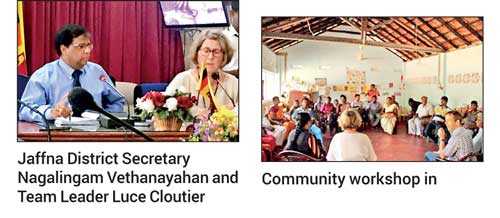Friday Feb 20, 2026
Friday Feb 20, 2026
Tuesday, 8 October 2019 00:00 - - {{hitsCtrl.values.hits}}

Aryans CGS and Atkins Acuity have recently completed a key socio-economic survey for a project on efficient and safe use of electricity for livelihood improvement in the north on behalf of the Sri Lankan Sustainable Energy Authority (SLSEA). The 18-month program was officially kicked off in February.
The sub-project is funded by the Japan Fund for Poverty Reduction (JFPR) and administered by the Asian Development Bank (ADB) to support productive energy use for three small isolated islands (Nainativu, Analaitivu, and Delft) of the Jaffna District in the Northern Province.
The Singapore-based Aryans CGS, together with the UK-based Atkins Acuity team, was appointed by the SLSEA to deliver the sub-project. The primary aim of the project was to implement energy-based livelihoods with a focus on women’s micro-enterprises development, end-user education for safe and efficient use of electricity and electrical equipment, and technical training and skills development to avail of employment and livelihood opportunities.
SLSEA Director General Dr. Asanka S. Rodrigo with the guidance of SLSEA Chairman T.M.R. Bangsa Jayah, closely supervises the project. Senior SLSEA officers Athula Jayathunga and Poornima Kalhari lead the implementation.
The socio-economic survey and report were completed as part of the project. The survey intended to provide baseline data which would be used to ensure the development of new income-generating opportunities for the residents of the three islands of the northern area of Sri Lanka: Analaitivu, Delft and Nainativu.
The general objective of the socio-economic survey was to document the current reality and specific needs of women and men living in the three islands to understand the social inequalities, needs of below poverty line (BPL) residents and female-headed households (FHH) and other vulnerable society groups. As seen during the month of June, the poverty line for Jaffna was considerably low. The data collected is used to form the basis to identify and establish microenterprises and training and skill development activities to improve the quality of life of the residents.
The results will enable the development of strategic training activities and will significantly support the development and implementation of the target MSMEs across the three islands.
Actions taken by the project will boost economic growth, reduce poverty, expand training, and strengthen the ability of men and women to develop improved skills in a new technological context. Ultimately, it should lead to the establishment of micro, small and medium enterprises (MSMEs) through which the communities could enhance their income capability.
The project was conceived as a way of improving the quality of life of all residents living on the three islands.
The socio-economic report concluded with a workshop at BMICH, attended by a number of stakeholders including the Department of Census and Statistics, Ministry of Education, and Ministry of Women and Child Affairs.
Project Manager Andrea Buetler delivered the key findings of the socio-economic survey along with recommendations and actions to be taken. The workshop was concluded after gaining valuable insights from the stakeholders with regards to income generation opportunities and their support for the upcoming activities.
Aryans CGS and Atkins Acuity enjoy a long-standing relationship with the Government, which ensures that the project will be delivered to meet the highest standards with the project team’s capability, commitment and awareness of the scope, deliverables, responsibilities, and expected outcomes.
The survey revealed:
Key recommendations: